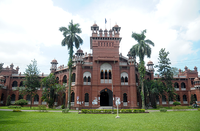 The year 2021 will mark the golden jubilee of Bangladesh's independence. In its 'Vision 2021' manifesto, the Bangladesh Awami League Party, who won the 2008 elections, committed themselves to building a "middle income country where poverty will be drastically reduced, where our citizens will be able to meet every basic need, and where development will be on fast track, with ever-increasing rates of inclusive growth."
The year 2021 will mark the golden jubilee of Bangladesh's independence. In its 'Vision 2021' manifesto, the Bangladesh Awami League Party, who won the 2008 elections, committed themselves to building a "middle income country where poverty will be drastically reduced, where our citizens will be able to meet every basic need, and where development will be on fast track, with ever-increasing rates of inclusive growth."
TWAS Research Professor Ahmed Abdullah Azad is in no doubt that any plan to achieve such ambitious development and prosperity in Bangladesh must include a massive, coordinated and expert investment in science and technology. Azad is keen to play his part and, during the last two years, his major concern has been to transform the existing Centre for Advanced Research in Sciences (CARS) at Dhaka University (DU) into a world-class research and technology centre for postgraduate research in agricultural, biomedical and environmental sciences.
The TWAS Research Professors in Least Developed Countries (LDCs) scheme was launched in 2005. More than 100 TWAS members have expressed interest in participating in the programme, which allows them to visit a research institution in an LDC three times during a five-year period for one to three months on each occasion. The areas of expertise of these members have been circulated to more than 1,000 institutions in LDCs so that they can select their preferred expert. Four TWAS Research Professors took part in the programme in 2011, including Ahmed A. Azad, whose experience is highlighted here.
Azad knows DU well. Born in Bangladesh, he obtained both his BSc and MSc in biochemistry there. DU was once considered one of the top four research universities on the Indian subcontinent and indeed, with the university's preparation behind him, Azad was able to secure fellowships to undertake both his doctorate and postdoctoral studies in molecular biology and biochemistry at the University of Toronto in Canada.
Azad went on to acquire over 38 years of varied research and management experience both in medical biotechnology and in the commercialization of research. After five years at the Australian National University, he spent 19 years at Australia's national science agency, the Commonwealth Scientific and Industrial Research Organisation (CSIRO) in Melbourne, as Chief Research Scientist and programme manager in molecular virology. He then spent five years as director of research at the University of Cape Town, South Africa, where he remains an honorary professor. His research focus has been in the development of drugs and vaccines against viruses that cause immunodeficiency.
By returning to his alma mater as TWAS Research Professor, Azad has been able to put his scientific expertise to the service of another key interest and passion: building science capacity in Bangladesh. Azad's personal contribution is to offer his expert advice and guidance in transforming the existing Centre for Advanced Research in Sciences (CARS) at DU into a productive research and technology resource centre that can serve as a model for other academic and research institutions in Bangladesh.
While DU still maintains a highly competitive undergraduate teaching programme, its research standing has sharply eroded over time due to lack of support. This has resulted in the absence of full time researchers, inadequate equipment (and the people trained in operating that equipment), and the absence of many contemporary technologies required for modern biosciences research.
During Azad's third and final visit to Bangladesh as TWAS Research Professor (1 February to 3 March 2011), he held a series of strategic meetings with the administrative and faculty representatives of DU and CARS, scientists from various other research centres, as well as representatives from government, industries and nongovernmental organizations. These wide ranging discussions led to some specific action plans, including structural modifications to the building and the transformation of a large number of rooms into open plan research laboratories to accommodate up to 150 additional full time researchers. One entire wing of the ground floor will be converted into offices for specialists in technology transfer (including intellectual property and liaison with industries) and there will be offices for regulatory issues such as bioethics and biosafety.
Most importantly, Azad guided the centre in implementing its new emphasis on teaching and training PhD students and postdoctoral fellows: PhD students with their own scholarships, together with their supervisors in the various science and engineering faculties already at DU, will be re-located and housed together in the specialized centre, which will include a large lecture theatre with the latest audio-visual facilities. CARS will also introduce the first advanced molecular biosciences postgraduate course in Bangladesh. An annual summer course in these same cutting-edge technologies will be offered, with the help and active participation of non-resident Bangladeshi researchers and technical experts.
Azad knows that the initiatives he has proposed during his TWAS Research Professorship "are extensive and ambitious" but he is convinced that they are "absolutely essential" if Bangladesh is going to compete internationally in science and technology. Now that his tenure as TWAS Research Professor has ended, he will remain in an advisory and coordinating role on all these projects, as well as assisting CARS and DU in fundraising from within and outside Bangladesh.

